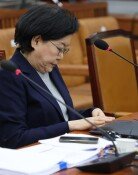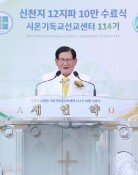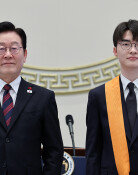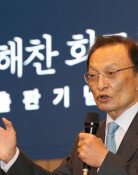A Japanese paster’s 43-year-long apology
A Japanese paster’s 43-year-long apology
Posted March. 08, 2024 07:40,
Updated March. 08, 2024 07:40
A few days ago, I attended a Sunday service at a church in my neighborhood, where I witnessed a poignant moment. An elderly man, seemingly over 80, descended from the podium, knelt down, and offered a big bow. A hush fell over the space, as the entire congregation fell silent. The man slowly rose as if lifting the weight of time from his shoulders and returned to the podium, his voice and body trembling.
“I would like to apologize for Japan’s invasion of Korea and the suffering it caused. It is impossible for a Japanese pastor to preach at this holy Korean church,” said Yoshida Gozo, the pastor of the Japanese Christian Church in Seoul, who has been serving in Korea for 43 years.
Pastor Gozo assumed his role in Korea in 1981, a time when the Christian population in Korea significantly outnumbered that of Japan. He said his mission was to apologize to the Korean people. He referenced Matthew 22:37-39, which goes, “Love the Lord your God with all your heart, and all your soul, all your mind, and all your strength,” while repenting for Japan’s past transgressions against its closest neighbor.
This year marks the 105th anniversary of the March 1 Independence Movement. Despite the passage of time, neither the Japanese government nor its statesmen have expressed regret for their historical wrongdoings. In his recently published memoir, former Japanese Prime Minister Shinzo Abe, the longest-serving in the nation’s history, dismissed the Murayama Statement of 1995, an apology for Japan’s wrongdoings committed during its imperialistic era, viewing it as a mistake, thereby practically undermining the official apology made by a Japanese prime minister for the first time. Given that the Joint Declaration between South Korea and Japan in 1998, aimed at overcoming the past and fostering a future-oriented relationship, was built upon the foundation of the Murayama Statement, Japan’s critique of a South Korean court’s ruling on compensation for women forced into sexual slavery during the Japanese occupation for having betrayed trust between the two countries is unreasonable.
“Japan apologized several times in the past In his memoir,” Abe said. “I thought we made enough apologies.” This sentiment resonated not only with far-right politicians in Japan but also with some South Korean politicians. However, there is no expiration in historical repentance. Ignoring the lessons of history, even for a moment, risks the recurrence of tragic events, as demonstrated by the Second World War that broke out a mere 25 years after the First World War.
When the Treaty of Versailles was concluded in June 1919, which required Germany to make reparations for civilian damage caused during the First World War, Germans argued that Britain, France, and other European powers should also be held accountable. It opposed the requirement under the Treaty to return Alsace-Lorraine, referring to it as “excessive punishment.” However, Germany had forcibly taken away the territory of the Baltic states and Georgia by pressuring the Soviet Union, which was in a vulnerable state due to a civil war, into signing the Brest-Litovsk Treaty in 1918 one year before.
Japan must heed Paster Gozo’s wisdom that “reconciliation is a process, and forgiveness should be sought repeatedly until the victim overcomes the suffering” so that Japan does not follow the historical missteps of Germany.







